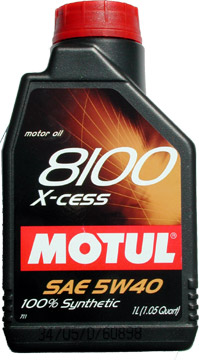OK, I thought I'd found the perfect oil: the VW 500/502/505 version of Motul 8100 "100% synthetic" X-Cess 5W-40. But I've found quotes from the US marketing director suggesting it this is only "semi-synthetic", whereas the bottle is clearly marked "100% synthetic":
![Image]()
From what I can tell, and according to their US marketing director, Motul's 300V oils are the only ones that are made from an ester base -stock (at least), whereas it looks like the 8100 X-Cess has 'no esters' and is 100% derived ultimately from ordinary petroleum...but somehow better since that has been refined further into PAO.
Is a 100% non-ester, PAO -only "synthetic" going to give me significantly better protection against coking the turbo than an ordinary dino oil not pitched as "synthetic" or more finely refined into PAO?
Does any Mobil 1 contain ester base stock? If not, should I care?
Paging AtomicAlex...I saw a thread where you did a nice job of discussing some of the disadvantages of having a 100% ester oil (paraphrasing...it's all vegetable/animal -derived and could break down into something nasty), but now I'm scratching my head as to whether there is much/any advantage to a 100% PAO 0% ester "synthetic" with respect to coking.[/img]

From what I can tell, and according to their US marketing director, Motul's 300V oils are the only ones that are made from an ester base -stock (at least), whereas it looks like the 8100 X-Cess has 'no esters' and is 100% derived ultimately from ordinary petroleum...but somehow better since that has been refined further into PAO.
Is a 100% non-ester, PAO -only "synthetic" going to give me significantly better protection against coking the turbo than an ordinary dino oil not pitched as "synthetic" or more finely refined into PAO?
Does any Mobil 1 contain ester base stock? If not, should I care?
Paging AtomicAlex...I saw a thread where you did a nice job of discussing some of the disadvantages of having a 100% ester oil (paraphrasing...it's all vegetable/animal -derived and could break down into something nasty), but now I'm scratching my head as to whether there is much/any advantage to a 100% PAO 0% ester "synthetic" with respect to coking.[/img]




